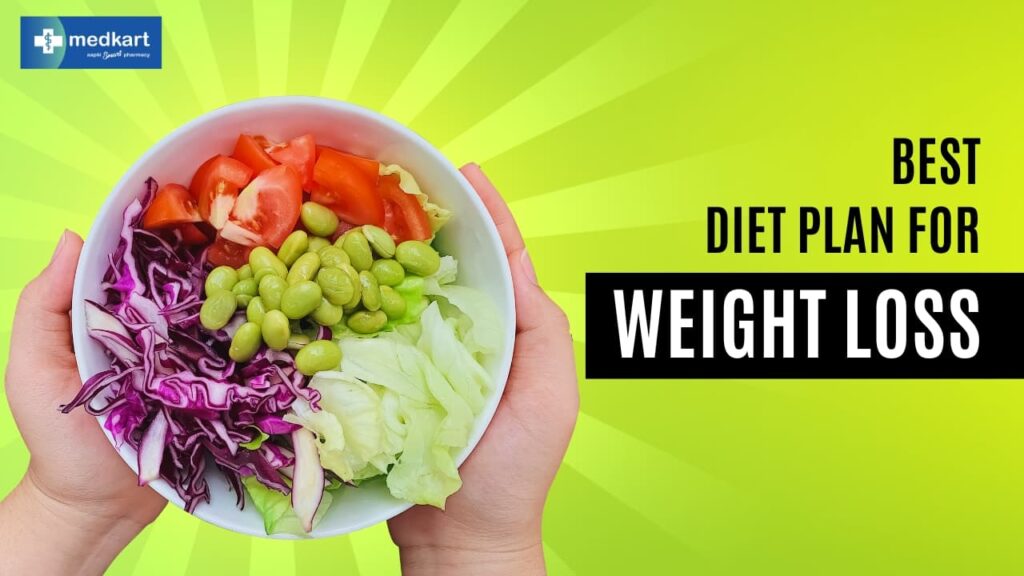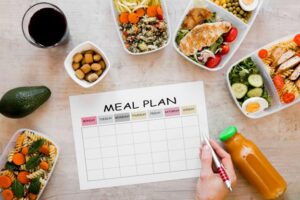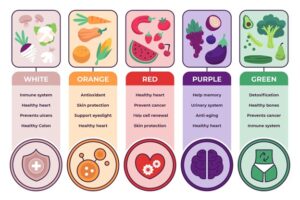Last updated on April 14th, 2025 at 05:34 pm
 A diet plan for weight loss is a structured eating regimen designed to help individuals achieve and maintain a healthier body weight. It typically involves creating a calorie deficit by consuming fewer calories than the body expends. A balanced weight loss diet focuses on nutrient-dense foods, including lean proteins, whole grains, fruits, and vegetables, while limiting processed foods and added sugars. Portion control, hydration, and a sustainable approach are integral components, emphasizing long-term lifestyle changes rather than quick fixes.
A diet plan for weight loss is a structured eating regimen designed to help individuals achieve and maintain a healthier body weight. It typically involves creating a calorie deficit by consuming fewer calories than the body expends. A balanced weight loss diet focuses on nutrient-dense foods, including lean proteins, whole grains, fruits, and vegetables, while limiting processed foods and added sugars. Portion control, hydration, and a sustainable approach are integral components, emphasizing long-term lifestyle changes rather than quick fixes.
Embarking on a weight loss journey requires a holistic approach that combines a balanced diet, regular physical activity, and a positive mindset. While exercise plays a crucial role, it’s essential to underscore the significance of a well-thought-out diet plan.
Diet Plan For Weight Loss
The best diet plan for weight loss is mentioned below:
Understand Your Caloric Needs
The foundation of any successful weight loss journey lies in understanding and managing your caloric intake. Calculate your basal metabolic rate (BMR) to determine the calories your body needs at rest and then factor in your activity level. Creating a calorie deficit—burning more calories than you consume—is fundamental for shedding excess weight.
Emphasize Whole, Nutrient-Dense Foods
Aim to fill your plate with whole, nutrient-dense foods that provide essential vitamins, minerals, and fibre. Choose lean sources of protein, such as poultry, fish, tofu, and legumes for a healthier dietary option. Include a variety of colourful vegetables and fruits to ensure a wide range of nutrients. Whole grains like quinoa, brown rice, and oats should replace refined grains with added fibre.
Prioritize Portion Control
Even nutrient-rich foods can lead to weight gain when consumed excessively. The key to managing calorie intake lies in exercising portion control. Opt for smaller plates, engage in mindful eating practices, and relish each bite to foster a balanced and healthy approach to nutrition. Pay attention to hunger and fullness cues to prevent overeating.
Hydration is Essential
Staying well-hydrated is often overlooked but is crucial for overall health and weight loss. Drinking water before meals can help control appetite, and opting for water over sugary beverages reduces empty calorie intake. Strive to achieve a daily intake of at least eight glasses of water, promoting optimal hydration for your well-being.
Include Healthy Fats
In defiance of commonly held opinions, it is crucial to recognize that not all fats pose a hindrance to the pursuit of weight loss. Include sources of healthy fats, such as avocados, nuts, seeds, and olive oil, as they contribute to satiety and support various bodily functions.

Plan Balanced Meals and Snacks
Designing balanced meals and snacks ensures a steady supply of energy throughout the day, preventing excessive hunger that can lead to overeating. Combine proteins, healthy fats, and complex carbohydrates in each meal to create a well-rounded and satisfying dish.
Limit Processed and Sugary Foods
Processed foods and those high in added sugars are often calorie-dense and nutrient-poor. Minimize your intake of sugary snacks, sodas, and heavily processed foods to support weight loss and improve overall health.
Keep a Food Journal
Maintaining a food journal helps track your eating habits, making you more aware of what and how much you consume. This awareness can lead to better decision-making and identify potential areas for improvement in your diet.
Also, Read:
- How to Remove Tan from Face?
- How to Increase Breast Size?
- Normal Blood Sugar Levels Chart
- How to Remove Dark Circles?
- How to Lose Weight Fast?
- How To Reduce Belly Fat
- How Many Calories in an Apple?
7-Day Diet Plan For Weight Loss
Embarking on a week-long diet plan can kickstart your journey towards achieving weight loss goals. This 7-day diet plan focuses on nutrient-dense foods, portion control, and balanced meals to promote sustainable weight loss. Remember, consult with a healthcare professional or a registered dietitian before starting any new diet regimen.
Day 1: Kickstart with Clean Eating
- Breakfast: Morning Meal: Delight in a savoury blend of fluffy scrambled eggs paired with the vibrant freshness of spinach and succulent tomatoes.
- Lunch: Revel in the nourishing goodness of a grilled chicken salad, featuring a medley of crisp mixed greens, and refreshing cucumbers, all adorned with a drizzle of a delicate vinaigrette.
- Dinner: Baked salmon along with quinoa and fresh steamed broccoli.
Day 2: Boosting Metabolism
- Breakfast: Greek yoghurt paired with an assortment of vibrant berries, delicately adorned with a dusting of nutrient-rich chia seeds.
- Lunch: Whole-grain tortillas with succulent turkey and vibrant vegetables, creating a harmonious fusion in the form of a wholesome wrap.
- Dinner: Stir-fried tofu with assorted vegetables and brown rice.
Day 3: Hydration and Detox
- Breakfast: Oatmeal with sliced bananas and a drizzle of honey.
- Lunch: Lentil soup with an addition to a side of mixed green salad.
- Dinner: Grilled shrimp with asparagus and sweet potato wedges.
Day 4: Fiber Focus
- Breakfast: Whole-grain bread toast with avocado and poached eggs.
- Lunch: Quinoa and black bean bowl with salsa and guacamole.
- Dinner: Baked chicken breast along with roasted quinoa and Brussels sprouts.
Day 5: Protein Power
- Breakfast: Smoothie with spinach, protein powder, and banana in addition to almond milk.
- Lunch: Chickpea and vegetable curry with brown rice.
- Dinner: Grilled steak along with a side of roasted fresh vegetables.
Day 6: Energizing the Body
- Breakfast: Cottage cheese with pineapple chunks and a handful of almonds.
- Lunch: Spinach and feta-stuffed chicken breast with a side of quinoa.
- Dinner: Baked cod with lemon and herbs, accompanied by steamed asparagus.
Day 7: Mindful Indulgence
- Breakfast: Whole-grain pancakes with mixed berries and a dollop of Greek yoghurt.
- Lunch: Caprese salad with fresh tomatoes, mozzarella, and fresh basil leaves.
- Dinner: Vegetable stir-fry with tofu and brown rice.

Tips for Success
- Stay Hydrated: Drink plenty of water throughout the day to support metabolism and curb unnecessary snacking.
- Portion Control: Practice awareness of portion sizes to prevent overindulging and consuming excessive amounts of food.
- Incorporate Snacks: Opt for healthy snacks like fruits, nuts, or yoghurt between meals to maintain energy levels.
- Limit Added Sugars: Choose whole, natural sources of sweetness and limit processed sugars.
- Be Flexible: While following the plan, listen to your body and adjust portions or food choices accordingly.
> Consult a Doctor and Medkart will help you Order Medicines Online
Conclusion:
A successful weight loss journey requires commitment, patience, and a well-designed diet plan. By focusing on whole, nutrient-dense foods, managing portion sizes, and staying hydrated, you can create a sustainable and effective diet plan that supports your goals. Remember, the key is to make gradual, long-term changes to your lifestyle for lasting results.
A 7-day diet plan provides a blueprint for healthier eating habits and supports your weight loss goals. Remember, success lies in making sustainable lifestyle changes. It is imperative to seek guidance from a healthcare professional before implementing substantial alterations to your dietary habits, particularly if you have pre-existing health conditions.
Read: What are Generic Medicines?
FAQs on Diet Plan For Weight Loss
Q1. What is a diet plan for weight loss?
A weight loss diet plan focuses on creating a sustainable calorie deficit, where you consume fewer calories than you burn. It emphasizes whole, nutrient-dense foods, including lean proteins, fruits, vegetables, and whole grains. Portion control, hydration, and mindful eating are crucial components to support weight loss. The key is to adopt a balanced and realistic approach that aligns with individual preferences and health goals.
Q2. What is the best diet plan for weight loss?
The best diet plan for weight loss is one that promotes a sustainable calorie deficit through balanced nutrition. It includes a variety of whole, nutrient-dense foods, such as lean proteins, fruits, vegetables, and whole grains. Portion control and mindful eating play crucial roles, while avoiding excessive intake of processed foods and added sugars. Customization based on individual preferences and health needs enhances effectiveness.
Q3. Is there a different diet plan for weight loss for females?
While the principles of a weight loss diet remain consistent, individualized factors like metabolic rate, hormonal fluctuations, and nutritional needs may vary for females. Tailoring the plan to accommodate these factors can optimize results and overall well-being.
Q4. Can I still enjoy my favourite foods on a weight-loss diet plan?
Yes, moderation is key. Incorporate your favourite foods occasionally while focusing on overall nutrient-dense choices to maintain a balanced diet.
Related Links:
